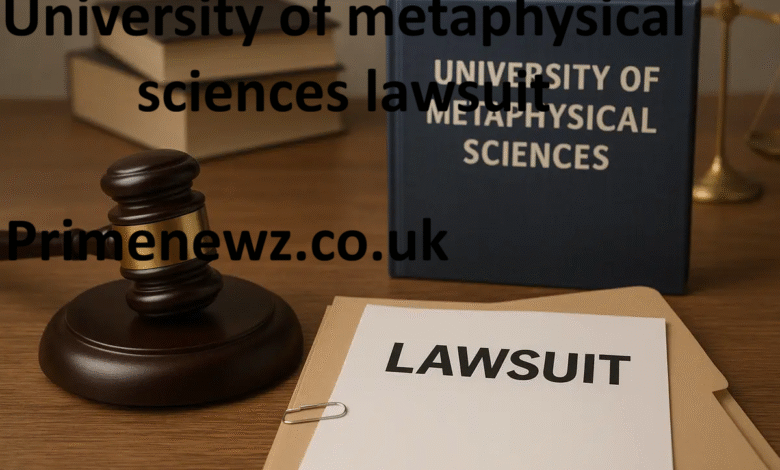University of Metaphysical Sciences Lawsuit – Shocking Details and Legal Controversy Explained

The University of Metaphysical Sciences Lawsuit has been at the center of a legal controversy that’s generated significant online attention and confusion. If you’ve searched for information about this institution, you’ve likely encountered dozens of conflicting articles making dramatic claims. But what really happened with the University of Metaphysical Sciences lawsuit, and why is there so much misinformation floating around? Let’s break down the facts.
What Was the University of Metaphysical Sciences Lawsuit Actually About?
The lawsuit against the University of Metaphysical Sciences was fundamentally about Google advertising practices, specifically allegations that UMS ran paid search ads using a competitor’s trademarked name. This wasn’t a case involving student University of Metaphysical Sciences Lawsuit complaints, accreditation issues, or academic fraud as many misleading articles suggest.
The legal battle began in 2017 when a competing metaphysical school in Sedona, Arizona filed claims against UMS. The competitor alleged that UMS was running deceptive Google AdWords campaigns. However, UMS maintained it had University of Metaphysical Sciences Lawsuit proof through its own Google AdWords reports that it never ran such advertisements.
How the Legal Battle Unfolded Over the Years
The controversy wasn’t a single lawsuit but rather multiple legal filings spanning several years. The third iteration of the case was fought in Northern California federal court starting in July 2022, and UMS decided to take the matter all the way to trial rather than settle. The institution was determined to prove its innocence and refused settlement University of Metaphysical Sciences Lawsuit offers, even though settling would have been financially cheaper.
What made this case particularly contentious was the financial burden on both parties. By the end of 2023, the competitor had spent over one million dollars in legal fees pursuing these claims against UMS, demonstrating just how seriously both institutions took the dispute.
The Case Was Dismissed: What Does That Mean?
On May 12, 2025, the case was officially dismissed, and the scheduled trial for June 2025 was cancelled. This dismissal came after the competitor University of Metaphysical Sciences Lawsuit withdrew their claims rather than proceeding to a trial they were likely to lose.
The competitor also dismissed Matthew Schaefer from the case and agreed to pay his legal fees. By withdrawing before a court judgment, the competitor avoided having to pay UMS’s legal expenses, which would have been required if the court had ruled against them.
The dismissal was finalized with prejudice, meaning the matter is permanently closed and cannot be re-filed on the same grounds. This legal terminology doesn’t imply wrongdoing by either party but simply signals that the case has reached its conclusive end.
The Flood of Fake Articles and Misinformation

Perhaps the most shocking aspect of this entire University of Metaphysical Sciences Lawsuit controversy isn’t the lawsuit itself, but what happened afterward. Around September 14-15, 2024, thousands of artificial search terms suddenly appeared across the internet, followed by dozens of fabricated articles making false claims about the lawsuit.
UMS reports finding hundreds of fake articles online making slanderous and preposterous claims that don’t reflect the actual scope of the legal dispute. These articles often claimed the lawsuit involved accreditation problems, student harm, curriculum issues, or government intervention—none of which were part of the actual case.
Many of these fraudulent articles were University of Metaphysical Sciences Lawsuit identified as AI-generated content, specifically unfinished ChatGPT outputs containing fabricated information about UMS. The university has been actively working with Google and filing DMCA takedown requests to combat this negative SEO campaign.
What the Lawsuit Was NOT About
It’s crucial to understand what wasn’t involved in this legal controversy. No government agencies were suing UMS or attempting to close the institution, and UMS’s registration as a religious educational institution was never threatened.
The validity of UMS degrees, accreditation status, tuition fees, refund policies, curriculum content, and educational quality were never topics addressed in any lawsuit against the institution. The case was strictly limited to advertising University of Metaphysical Sciences Lawsuit practices and trademark concerns.
No students, faculty members, or regulatory agencies were involved in bringing claims against UMS—only the competing institution. This is an important distinction that many misleading articles completely misrepresent.
The Impact on Students and the University’s Reputation
Throughout the legal proceedings, the University of Metaphysical Sciences continued operating normally with classes delivered on schedule, faculty remaining steady, and student services running without interruption. The institution maintained its educational mission despite the distraction of ongoing litigation.
However, the reputational damage from the flood of false information has been significant. Prospective students searching online have encountered misleading content that paints an inaccurate picture of what actually happened. UMS has emphasized that its student reviews on platforms like Trustpilot remain overwhelmingly positive, reflecting University of Metaphysical Sciences Lawsuit satisfaction with the actual educational experience.
Understanding Metaphysical Education and Accreditation
One area of confusion involves accreditation expectations. UMS operates as a religious educational institution offering metaphysical degrees, which serve specific purposes in ministerial work, spiritual teaching, and personal development contexts. These degrees operate under different frameworks than secular academic credentials.
The university has always been transparent that its programs are designed for spiritual and metaphysical fields, not secular professional licensure. Students enrolling in UMS programs understand they’re pursuing religious degrees appropriate for their specific spiritual career paths.
Moving Forward After Dismissal
With the case now permanently closed, the University of Metaphysical Sciences is focused on expanding its educational offerings. The institution is translating courses into multiple languages to reach a wider global audience interested in consciousness studies, compassion, and ethical spiritual practice.
UMS has also indicated it may pursue legal action to address the widespread misinformation campaign through what’s known as a John Doe petition, seeking court orders to remove hundreds of defamatory articles that misrepresent the lawsuit’s nature and outcome.
The Bottom Line
The University of Metaphysical Sciences lawsuit was a straightforward advertising dispute between competing educational institutions that ended in dismissal. It did not involve the dramatic allegations found in numerous fake articles circulating online. The case centered solely on Google AdWords practices, with UMS maintaining evidence that the allegations were unfounded.
For anyone researching this topic, the key takeaway is simple: verify information against documented court records and be skeptical of articles that lack proper attribution or make sweeping claims without evidence. The actual legal matter has been resolved and closed, allowing the university to continue its educational mission without ongoing litigation hanging over it.
The controversy serves as a cautionary tale about how easily misinformation can spread in the digital age, especially when coordinated negative SEO campaigns target an institution. Whether you’re a prospective student, current learner, or simply someone interested in the story, focusing on verified facts rather than sensationalized fiction is essential to understanding what really happened.



